
Big Mouth writer and sparkling Black queer personality Brandon Kyle Goodman has a trove of stories to tell. Thankfully, he’s got just the way with words to tell them.
His new memoir You Gotta Be You: How to Embrace This Messy Life and Step Into Who You Really Are is as aptly titled as it is thoroughly subtitled. Through stories of being a queer child to a born-again Christian mother and a Black nonbinary person in America, Goodman both drives home the importance of being yourself and provides the tools to do so.
It reads like a one-man show in parts — we can thank the Tisch theatricality for that — and ends up an accessible, engaging, read. You laugh, you gasp, and heal just a little along the way.
We caught up with Goodman to chat all things You Gotta Be You, from the first love to the lasting message. Well, after we chatted about the stars a bit first, that is.
How about we take this to the next level?
Our newsletter is like a refreshing cocktail (or mocktail) of LGBTQ+ entertainment and pop culture, served up with a side of eye-candy.
QUEERTY: We wanted to start with something exciting that happened recently: your time with the Emmys!
GOODMAN: Oh my god. Yes.
It was so fun having you behind the stage and getting to see all of your reactions. What was it like taking in things like that Sheryl Lee Ralph moment right in front of you?
Oh, that specifically was wild and intense. I forgot where I was. There’s a shot somebody sent me: it’s me and Natasha Rothwell, and we’re the only ones standing. I think it’s because the both of us were suddenly in church. The decorum of like, “Oh, it’s the Emmys and that person’s over there,” that didn’t matter. It was like we were literally standing inside of history.
I wanted Sheryl Lee Ralph to win so badly. It’s overdue. So I mean, it was… iconic just feels too light of a word. It was really emotional, and really inspiring. A black woman on that stage for the first time in 35 years since Jackée [Harry]? Like, you can stand. If I could have stood the whole time, I would have.
Y’all caught the spirit.
Yes! Oh, we caught it. I haven’t watched it back because I’m afraid, but I caught the spirit. And she did too! You see it, you see her take that moment. And then she opened her mouth to sing, and I was like, okay, church. Not the Emmys, we’re in church. Let’s go. Let’s go.
View this post on Instagram
You write about Oprah [Winfrey] a good amount in your book. Had you ever been in the same room with her like that before?
I’m still shaking. It was crazy. I don’t think I’ve told anyone this story. What had happened was, we got seated before the show started, and suddenly, on stage with four very big people and some producers walks this Black woman in white with a mask and a long braid. And I was immediately like, “Oprah. That’s f*cking Oprah. I know Oprah when I see f*cking Oprah.”
So they’re like showing her stuff, and I’m with another friend and we’re just trying not to stare at her. We’re sneaking out of the corners of our eyes. And then she leaves, and I immediately forget that Oprah was there. My body just forgot. When Kenan announces her again. It was like another exciting moment.
I didn’t know that I was going to be on camera. Because I’m behind her, I can’t see her face, but I could see the teleprompter – and it’s SO f*cking big – so I’m reading along with the teleprompter. All the screenshots I get of me are of a dead face looking into the camera because I’m looking into the teleprompter.
Somebody sent me a photo where I’m smirking, and it’s because Oprah was changing little words here and there. I was like, “That’s good. That was a good change, Oprah.” It was amazing. It was unreal. Between that and Sheryl Lee Ralph, it was just incredible.
View this post on Instagram
Can you summarize the core of what you set out to do with your memoir?
I set out to inspire people to love themselves at base, and to really question everything that we’ve been told that we should be based off of the labels of our identity: how we’re supposed to dress, how we’re supposed to act, who we’re supposed to love. I really wanted to galvanize people to question it all.
The first page next to the introduction is one of my quotes, which is, “Who would I be if society never got its hands on me?” I wanted to galvanize people to ask that question and dare to be themselves. It sounds so corny, because it’s what you’re told in school all the time, to just be yourself. But no one teaches you how to be yourself.
Especially if you’re queer, if you’re Black, if you’re a woman, if you’re a POC, everything around you is telling you how wrong you are and how not good you are and how not valuable you are. So how do you figure out how to be yourself? I wanted this book to share my journey to discovering that.
View this post on Instagram
There is something about the specifics of your personal journey that really help that emotion connect. Specifically, there’s this one storyline throughout the memoir where you write about your first love, who you call “Pinky” (for an incredible reason that people need to read your book to find out). Have you ever reconnected with him since the fallout?
Ah, yes, Pinky and I. I didn’t put it in the book, but we met up I want to say three or four years ago, I think I was in New York doing the premiere for Modern Love, and we decided to get dinner. So we got dinner, and just apologized to each other. We really held space for the experience that we had, and how it went left, and what we were both struggling with at the time.
I think it was such a pivotal moment in my life in general, because I never thought we would have that closure. The work after a breakup is to get closure without often getting real closure. To know that it is possible to show up with somebody that you might have hurt or may have hurt you and still be able to love each other again was a really important lesson for me to learn.
View this post on Instagram
You mentioned holding space, and you write a good bit about holding space for emotion. What would you say that looks like in your daily life?
I think it begins with you. My mother used to always say – well, it’s a common phrase – when a plane goes down and the oxygen masks come out, put yours on first, because if you’re not breathing, you can’t help anybody else. I think the same is true about holding space; if you can’t hold space for yourself, you can’t hold it for anybody else.
Personally, it looks like waking up two hours before I have to be somewhere – which means I’m usually up at like 5:30 or 6:00am – and having that quiet time where my husband’s asleep, my dogs asleep, and it’s just me. I get to meditate, I get to listen to music, I get to do a little journaling, and just check in. How do I feel? What do I need? How can I take care of myself? How can I set myself up for the day?
And then it’s periodically checking in throughout the day. I always ask the question, “How’s your heart?” When you say “How’re you doing?” people go, “I’m good!” and it’s like, okay, but I want to hold space if there’s something going on.
I want you to know that I’m here, you don’t even have to tell me the details, but feel free to say “today sucks,” or like “I’m broken,” or “I’m feeling whatever.” I also want to ask myself that question throughout the day. How’s my heart? And what can I give to myself?
It sounds like it’s important to check in periodically. As soon as you start going on autopilot, that’s when you disconnect.
That’s when you disconnect, and that’s when you start – I always say – reacting instead of responding. Reacting comes off as an attack, because there’s no thought about it, you’re just doing it. That’s opposed to being able to respond.
I think if you’re practicing holding space, you get to really respond. When people do things that are troublesome, you don’t take it on as your fault, you don’t take it on as your thing; you can see their humanity. Then you can give a response, as opposed to fueling the flame.
Are there any of these practices that come from your husband’s experience as a life coach that you’ve kind of taken on throughout your relationship with him?
That’s so funny. No, my husband’s been inspired by me, darling. My husband would be the first to tell you that a lot of this stuff, I was already doing. It was him that really – through our relationship, but also through his own desire to just be a better person and learn about himself – really started stepping into mental health and stepping into the ways in which he could ground himself.
View this post on Instagram
I’m wondering, is there anything that you wrote in the memoir that you never thought that you would confess in writing?
Yes, definitely. The chapter called “Life Is Hard. We All Deserve Help.” is about an emotionally abusive relationship, and I think it might have been one of the last chapters I wrote. I wasn’t sure if I was going to share about it.
I think that the reason I did is because as queer folks, we’re introduced to heterosexual relationships from the jump. All we’re given are heterosexual relationships. So oftentimes, we don’t know how to navigate the dynamic of two people who are of the same sex or are in a queer relationship, because there are things that are a little different. The heteronormative roles may be reflected, but it’s not the same dynamic, and there’s not really a lot of guidance on how to navigate that.
That particular relationship was obviously not great. I thought it important to share not to, like, drag him, but just to say, “This is what it looks like for those of us who are searching for love, because we’ve been denied it for so long.”
I think oftentimes we settle for scraps. We just haven’t been able to experience love, whether it’s at home in community or in college and high school. We settle because we think, “Oh, this is the best I can do. I’m gay, or I’m trans or I’m nonbinary; no one else will love me.” So you settle, and you ignore red flags. I thought it was important to talk about that.
So many times, when going through abuse or or being marginalized, you do kind of minimize it in your head during and after the fact. Did putting this all down in writing help validate it internally?
That was the biggest thing the book did for me. In that chapter, my mother’s chapter, and the chapter on my grandmother, yes. In my head, even in therapy, I minimize it. But then writing it and reading it back, it was like, “Oh, right.” If anyone else told me this story, I would name it. “Oh, that’s emotional abuse” or “That’s homophobia” super clearly.
But for all these years, it’s been hard to hold the full weight of it, and to really be like, “No, that’s a traumatic, tragic thing that you should never have had to experience.” The book really allowed me to hold space for it so that I could actually heal it. I don’t think you can heal the thing you’re not going to acknowledge.
View this post on Instagram
If you had to target one singular internal quality that you feel has gotten you where you are today, what do you think it would be?
Oh, determination. My mother and my grandmother used to tell me this story from when I was a toddler. There was some plastic bottle with a twist-off cap on the ground that I was playing with, and I kept pulling it instead of twisting it.
The story they would always tell me growing up was them watching me just be relentless, like would not stop, and they were like, “Oh my god, that kid is determined.” I think my quality is just like, “I’m gonna open that bottle. I’m gonna figure it the f*ck out eventually.” That’s the quality that has gotten me to this point.
View this post on Instagram
One final all encompassing question: Why should you, and not one of your competitors, be crowned America’s Next Drag Superstar?
Well, you know, apart from just being stunning…
You know what? I don’t know if I should be crowned America’s Next Drag Superstar. I don’t know if I’m the girl. And I think that we all deserve a crown, honestly, because we’re all different. We all have something valuable that we bring to the table. We all do, our artistry and our existence, it’s all different.
It’s all important, it’s all valuable, and I’m better because of my quote unquote “competitors”. I’m even better when I’m not in competition with them, but am able to be a stepladder for them in the same way that a lot of them are stepladders for me. We’re able to join hands – this is the Miss Congeniality answer, but it is my answer!
Winning things always stresses me the f*ck out. I like the idea of like, “baby, I’m not in competition with y’all, and that’s why I should win. I’m in my own competition, and I’ve already won.”
That answer is very much giving Peppermint, and I respect it.
Thank you. Burp. It’s fashion.



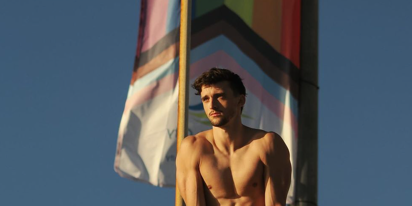
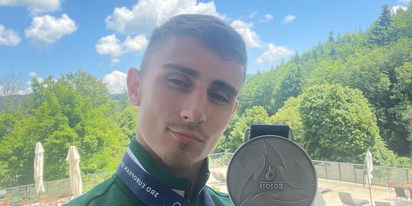
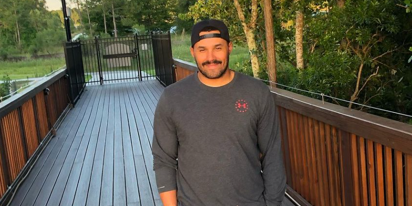
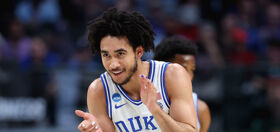
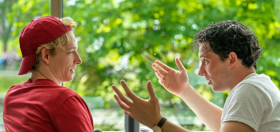

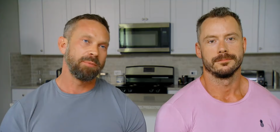

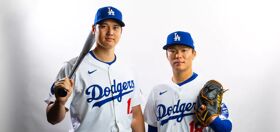

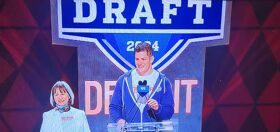
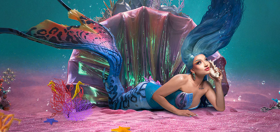
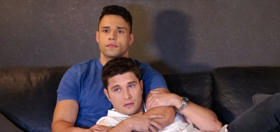

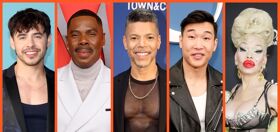
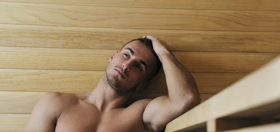

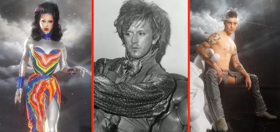
abfab
SOS.
Please. No more skanky armpit shots.